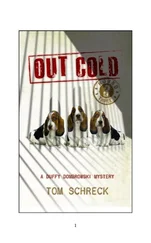At this point her mutterings had lost me completely, and I was feeling uncomfortable, shifting in my seat. The farmer, sitting by the fire, must have noticed because he called out, 'Mother! Are you still going on about Glaesir. Leave the youngster alone, will you. I told you I don't believe there's any harm in the animal, and if there is I can deal with it.'
The old woman made a sniff of disgust, got slowly to her feet, and moved off down the hall. I was left to myself.
'Ignore her, young fellow,' called the farmer. 'And I wish you a safe journey wherever it is that you are going.'
'Was the farmer's name Thorodd?' asked Snorri, who had been standing silently, listening to my account.
'Yes, I think so,' I answered.
'He farms over at Karstad all right and there's a young bull in his herd called Glaesir. It's an animal you couldn't miss, spotted, very handsome. Frisky too. Some people think the animal is inhabited by the spirit of another Thorodd, a man called Thorodd Twist-foot. I had several quarrels with him. The worst was about the right to cut timber in a small woodland he owned. He got in such a rage that he went home and had a fit. Next morning they found him dead, sitting in his chair. They buried him twice. After the first time, when his ghost began plaguing his old farm, they dug up the corpse and shifted him to a hilltop, where they buried him under a big cairn. Then, when that didn't work and his ghost kept reappearing, they dug him up again. The grave diggers found that the body had not rotted away but just turned black and stank, so they burned the corpse to ashes on a pyre. Some say that the ash blew onto a nearby beach and was licked up by a cow feeding near the shoreline. The cow later gave birth to two calves, a heifer and a young bull calf. That's the one they call Glaesir. The Thorodd you met has a mother with second sight, or so it's said, and ever since that bull calf got on the farm, she's been wanting someone to kill it, saying that it will do terrible damage. Did you see the calf? He's a young prize bull now. Quite remarkable colouring.'
'No, I left the farm at first light next morning,' I replied. 'I wanted to get on my way early, and I didn't see Thorodd's mother again. I expect she was still asleep when I left. And there was nobody about, except for a few farm servants. I don't know anything about Glaesir. I just know that the farmer looked as if he had a serious injury to his side.'
Snorri was trying to assess what I had just told him. 'Maybe you do have second sight,' he said, 'but it's not quite in the usual way. I don't know. You seem to have it only when you are with others who also possess the gift. Like a mirror or something. You are young, so perhaps that will change. Either the sight will grow stronger or you will lose it altogether.'
He shrugged. 'I don't have the sight, though some people think
I do,' he said. 'My common sense tells me what is likely to happen, and the result is that many believe that I can see into the future or into men's minds.'
Whether Snorri believed I had the sight or not, from that moment onward he treated me as something more than a itinerant farm labourer. At the end of the day's work I was seated not among the farmhands down the far end of the hall, but alongside Snorri's large and rather boisterous family, and when he had free time — which was not often because he was such a busy man — he would continue with my education in the lore of the Old Gods. He was more knowledgeable in these matters than either Tyrkir or Thorvall the Hunter had been, and he had a more elegant way of explaining the intricacies of the Old Ways. Also, whenever Snorri went into the Thor temple, he expected me to go with him.
Such visits were surprisingly frequent. Local farmers came to pay their respects to Snorri as the local chieftain and ask his advice, and they spent hour after hour in the evenings, talking politics, negotiating land rights, discussing the weather and fishing prospects, and mulling over whatever news reached us via travellers or traders. But when the talking was over, and especially if the farmers had brought their families, Snorri would beckon to me and we would all walk across the farmyard to the temple shed, and there Snorri would hold a small ceremony to Thor. He would put on the iron arm ring, say prayers over the altar stone and present to Thor the small offerings brought by the farmers. Cheese, chickens, haunches of dried lamb were placed on the altar, or hung from nails driven into the ring of surrounding wooden pillars. These pillars were tied with ribbons brought by the farmers' wives, together with scraps of children's clothing, milk teeth wrapped in packets, embroidered belts and other personal articles. Frequently the women would ask Snorri to look into the future for them, to prophesy what would happen, what marriages their children would make, and so forth. At such moments Snorri would catch my eye and look slightly embarrassed. As he had warned me, his prophesies were largely based on common sense. For example, when a mother asked whom her young son would marry I noticed that Snorri often identified - though not exactly by name - the daughter of a neighbour who, like as not, had visited the temple the previous week and asked exactly the same question about her young daughter. I never found out whether any, or all, of Snorri's matrimonial prophecies came true, but the fact that the parents thenceforward nurtured the probability of a particular match for their offspring must have helped to bring it about.
However, on one particular occasion which I will always remember, Snorri behaved differently. A small group of farmers — there were about eight of them - had come to see him because they were worried about the weather for the hay harvest. That year there had been little sunshine and the hay growth was exceptionally slow. But eventually the long grass in the meadows was ready to be cut and dried, and everyone was waiting for a spell of good dry weather to do the work. But the days continued cloudy and damp, and the farmers were increasingly worried. If they did not get in their hay crop, they would be obliged to slaughter many of their cattle for lack of winter feed. A bad hay crop, or worse, no hay crop at all, would be a major misfortune. So they came to Snorri to ask him to intercede on their behalf because, of course, Thor controls the weather. Snorri led the farmers into the temple building and I went with them. Once inside, Snorri made offerings, rather more lavish than usual, and called on Thor, using the fine rolling phrases and archaic Norse vocabulary which are a mark of respect to the Gods. But then Snorri did something more. He called forward the farmers to stand around the central altar stone. Next he made them form a circle and join hands. Snorri himself was a member of the circle and so was I. Then Snorri called out to the men and they began to dance. It was the simplest of the stamping dances of the Norsemen, an uncomplicated rhythm, with a double step to the left, then a pause, a step back, a pause, and then two steps more to the left, their clasped hands swinging out the rhythm. The men swayed down and then arched back at the end of each double step.
As I joined in, I had a strange feeling of familiarity. Somewhere I had heard that rhythm before. For a moment I could not recall when and where. Then I remembered the sound that I had heard while wandering in the forest of Vinland, the strange rhythmic sound that had led me to the shelter of branches with the sick Skraeling inside, and the older man chanting over his body and shaking his rattle. It was the same cadence that I now heard from the Icelandic farmers. Only the words were different. Snorri began a refrain, repeating over and over the same phrases, and this time he was not speaking archaic Norse. He was using a language that I could not recognise. Again there seemed to be something distantly familiar about it. Several of the farmers must have known the same spell language because they began to chant in time with Snorri. Eventually, after nine circuits of the altar, left-handed against the sun, we stopped our dance, straightened up and Snorri turned to face north-west across the altar. He raised his arms, repeated another phrase in the same strange language, and then the spell session was over.
Читать дальше








